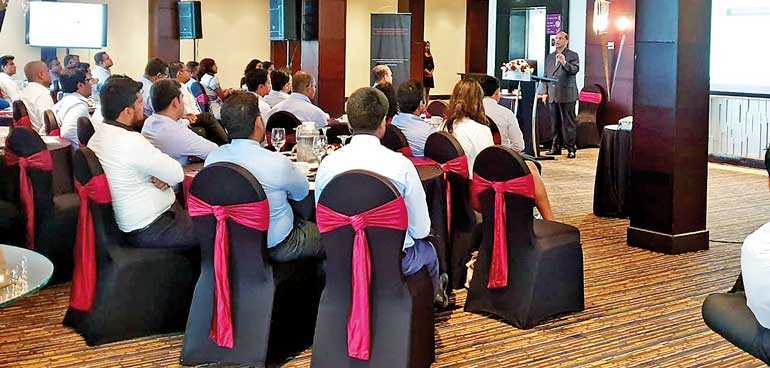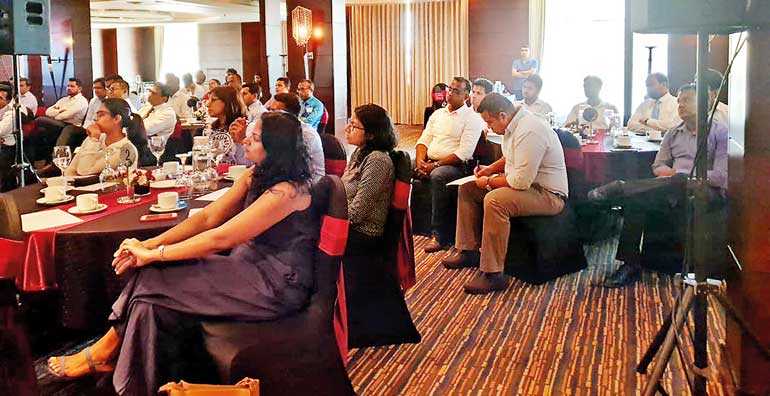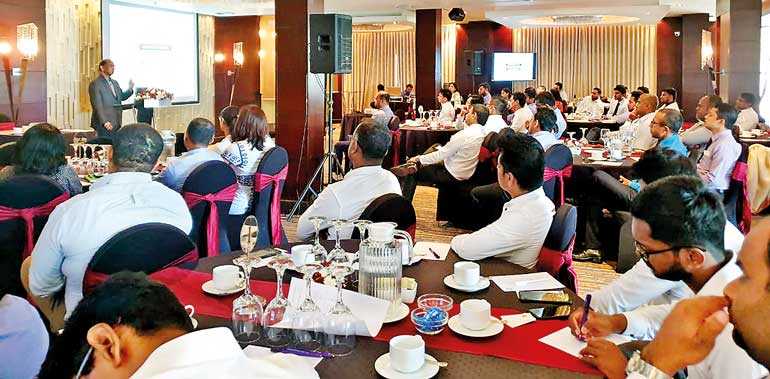Sunday Feb 22, 2026
Sunday Feb 22, 2026
Thursday, 5 March 2020 02:41 - - {{hitsCtrl.values.hits}}

Achieving the right balance between stewardship and business partnering was the key topic of discussion at the ‘Conformance vs. Performance’ session of the 4 modular ‘CFO of the Future’ training program conducted by Ronnie Peiris, Coach, Mentor, Consultant and former Group Finance Director, John Keells Holdings PLC, at the Cinnamon Lakeside on 24 February.
After painting a picture of the volatility, uncertainty, complexity and the ambiguity of the current, and emerging, business environment, the participants were apprised of many real-life situations evidencing, and representing, the Principles Guiding the Role and Expectations of a CFO as promulgated by the International Federation of Accountants (IFAC), these being;
In the presentation, and the interaction which followed, the CFO’s role in a futuristic operating environment shaped, and characterised, by sustainable development, technology, digitisation, innovation, rules and regulation, globalisation and shareholder activism, amongst many others, was discussed in detail.
There was consensus among the participants that, as described by IFAC, the CFO was no longer just a ‘Preserver’; i.e. safeguarding the company’s assets and gatekeeping all matters – finance, accounting and associated, risk management and internal control and a ‘Reporter’; i.e. disseminating true and fair information to a multiplicity of stakeholders, but also a ‘Creator’ and ‘Enabler’ of value through strategic direction, decision support and performance management.
The increasing involvement of the CFO in information technology including digitisation/cyber security, procurement, legal and HR was also discussed and brought to life by way of actual experiences.
The presentation while highlighting the importance of the custodial role of the CFO in areas of governance, conformance and risk management also stressed on the essentiality of a CFO’s ability to effectively engage with the board and with various stakeholders, both external and internal.

It was pointed out that to do this, a CFO or aspiring CFO had to possess technical skills, leadership skills, communication skills and people management skills in facilitating and inculcating collaboration and trust. The aforesaid competencies being those recommended by the Chartered Institute of Management Accountants (CIMA) and the American Institute of Certified Public Accountants (AICPA). The configuration of the finance and accounting function in terms of structure and delivery and the importance of a strategy to attract, develop and retain the financial skills necessary to promote both the stewardship and business partnering needs were also described. Shared services and outsourcing and the role of the finance and accounting function in serving business divisions such as operations, marketing, human resources management and research and development was also summated. As stated earlier, these were brought to life through real-life experiences.
The essentiality of the CFO to be professional and bring professional qualities to his role, the finance and accounting function and the organisation was emphasised. The responsibility of the CFO in ensuring that the organisation’s pursuit of her goals and objectives were in keeping with the highest standards of ethics, integrity and professionalism was stressed.
The participants were also reminded of the “pecking order” of a professional’s allegiance, this being, in descending order; allegiance to the public, allegiance to the profession, allegiance to the employer and lastly to one’s self. Experiences from the presenter’s career, and life, were shared in illustrating the professional principles of credibility, integrity, objectivity, professional competence and due care and confidentiality.
The presenter was asked many questions on the various situations faced by CFOs, and equivalent, in their day to day duties. These ranged from the accounting/reporting pressures experienced by a CFO from a CEO/top management enjoying incentives linked to bottom lines and the critical success factors in establishing a world class finance and accounting function… to winning the hearts and minds of operational peers without compromising on his stewardship duties, the CFO’s role in driving performance and dealing with the information technology needs.
As was summed up by Ronnie when interviewed by FT, “The art of responding to the professional dilemmas faced by a CFO is not found in a textbook. The message I carry comes from years of practice, proven experience and results.”
The participants agreed, in unison, that it was the linkage of actual practise to the concepts which differentiated the program from the many other they had attended previously.
The second module of the CFO of the Future Training Program, ‘Evaluating Projects – the Pitfalls and Managing Risks – Operational, People, IT, etc.’ is scheduled for 31 March at Cinnamon Lakeside from 2 p.m. to 5 p.m.
